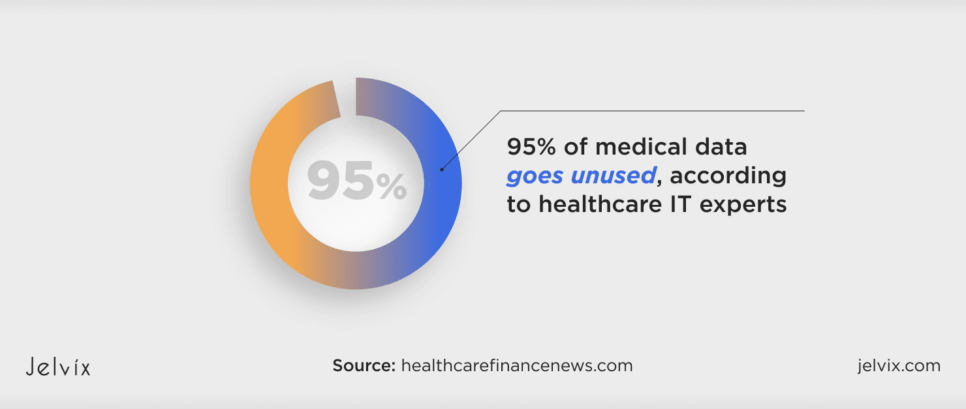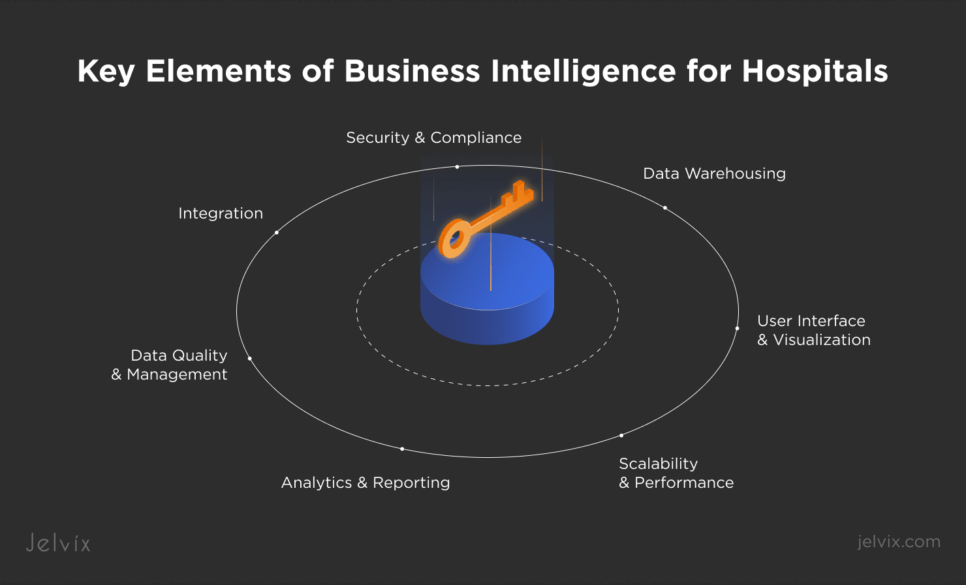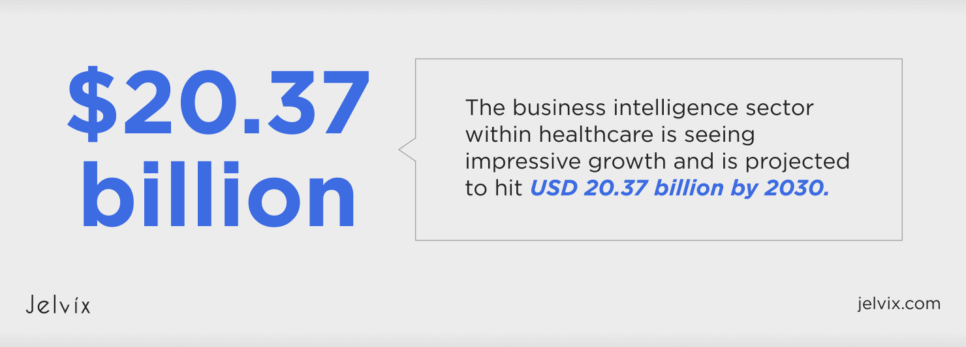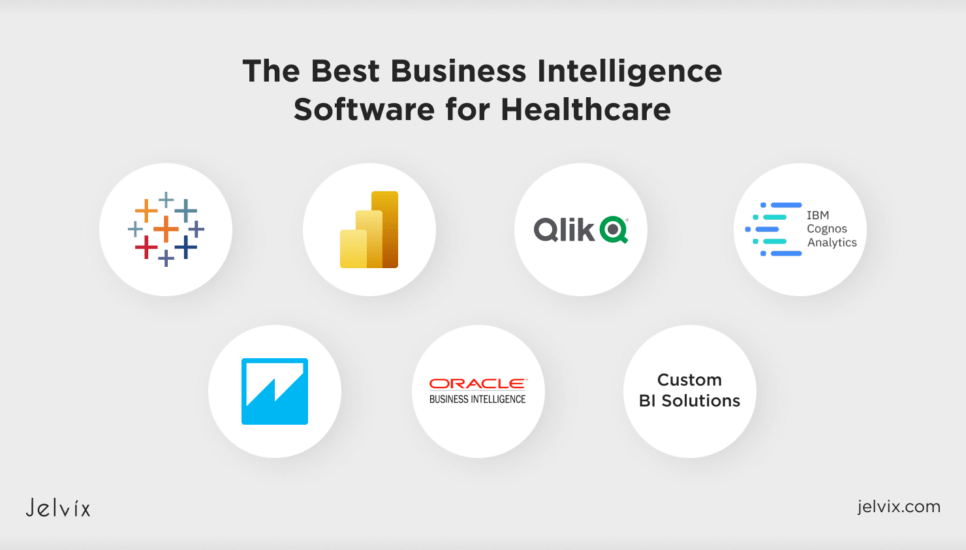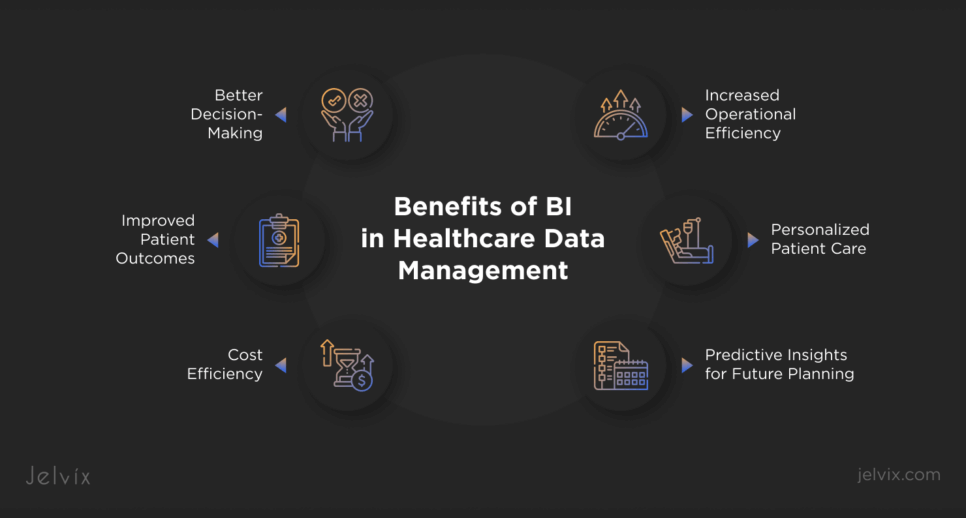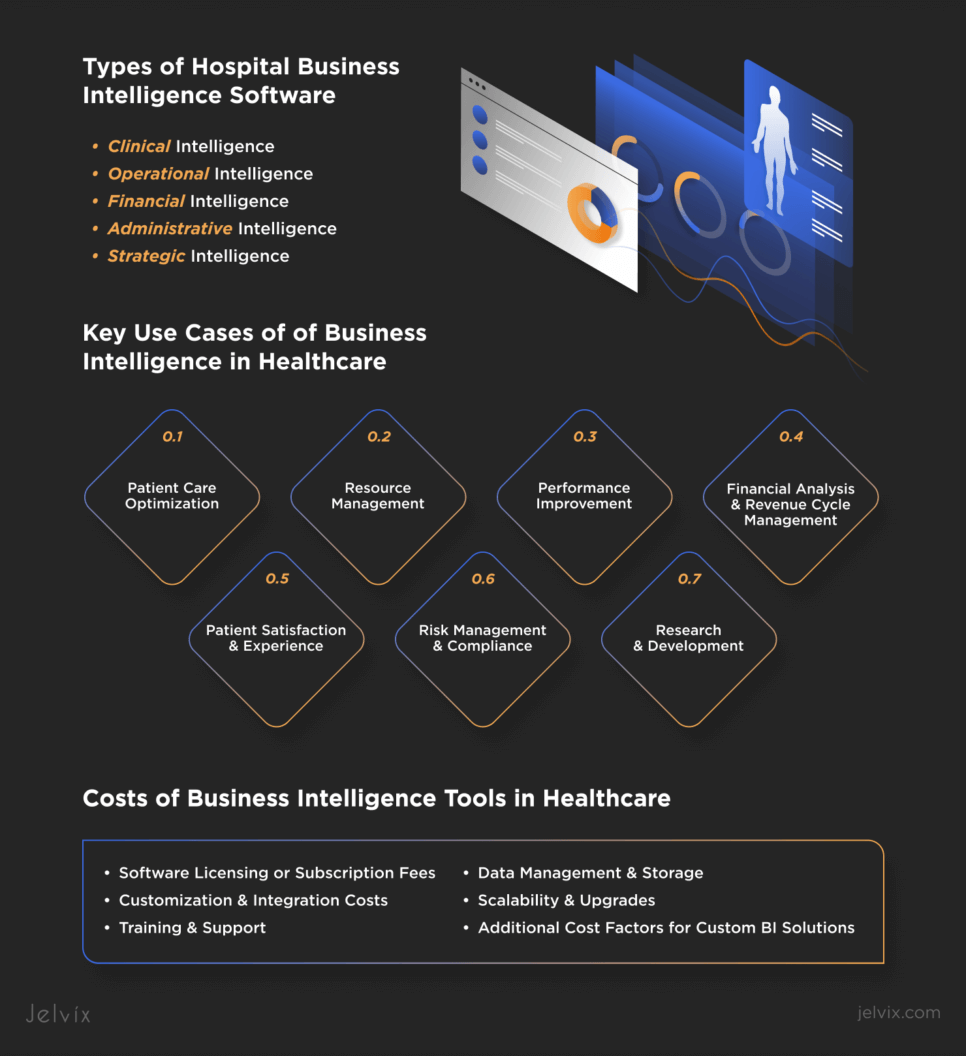It’s nothing new that the amount of healthcare data keeps increasing. Although all this info could be used to gather valuable insights about patient behaviors and health trends, 95% of medical data goes unused.
The good news is that medical facilities can improve the situation and start managing their data efficiently with the help of business intelligence tools.
If you want to make informed decisions that align with global healthcare trends and keep your clinical practices up-to-date, read this article. You will discover how BI solutions can help you gather and analyze medical data for improved decision-making in healthcare.
Key Elements of Business Intelligence for Hospitals
In healthcare, Business Intelligence (BI) uses data-driven tools and strategies to sift through varied healthcare data like patient records and financial reports to enhance care delivery. Its primary aim is to boost decision-making processes and optimize operations across healthcare facilities. BI in healthcare is grounded in several core components, including data integration, warehousing, analytics, and reporting tools.
Integration
This process brings together data from disparate sources such as electronic health records, billing systems, and patient feedback, providing a holistic view that enables precise and patient-specific healthcare decisions. This integration supports clinical interoperability and helps reduce data redundancy and errors that arise while handling data stored in multiple systems.
Data Quality and Management
The reliability of medical decisions relies heavily on the integrity of data. Ensuring data is accurate, up-to-date, and consistently formatted is crucial. Effective data management minimizes errors, safeguarding patient care against potentially detrimental decisions based on faulty data.
Data Warehousing
A data warehouse is a central location where all the collected data is stored. Data warehousing facilitates complex analyses without impeding the performance of other systems. This setup supports detailed retrospective studies to evaluate treatment outcomes and refine future business strategies.
Analytics and Reporting
BI tools analyze data to uncover current trends, understand underlying causes, predict future scenarios, and recommend proactive measures. For instance, insights given by predictive analytics in healthcare within BI tools are visualized through intuitive charts and graphs, making complex data digestible and actionable for everyone within the organization, from clinical staff to administrative personnel.
User Interface and Visualization
The way data is presented is important. A good BI system shows data simply and clearly so that everyone, from doctors to hospital administrators, can comprehend it quickly. Effective visualization aids in quick understanding and can significantly reduce the time physicians take to find the needed information.
Security and Compliance
BI systems must protect data privacy with strong security measures like controlled access and data encryption. They also need to follow legal rules like HIPAA and GDPR to secure patient information from breaches. This compliance ensures that the organization avoids legal penalties and builds trust with patients and stakeholders.
Discover how Jelvix ensures security compliance through rigorous planning, transparent processes, and adherence to best practices.
Scalability and Performance
As healthcare organizations grow, so does the amount of data. A scalable BI system grows with the company, accommodating more data and complex analyses without degradation in performance. This helps ensure that healthcare providers can continue to rely on the system for insights regardless of the size of the data or user base.
Business Intelligence in the Healthcare Industry: Market Overview
The business intelligence sector within healthcare is seeing impressive growth and is projected to hit USD 20.37 billion by 2030. This increase is mainly driven by the healthcare sector’s ongoing efforts to enhance patient outcomes while cutting costs.
What’s more, there’s a growing demand for patient-centered care, which is further boosting the uptake of BI tools. In particular, their use helps healthcare entities gain deeper insights into patient behaviors and preferences and leads to improvements in patient satisfaction and the quality of the delivered care.
Benefits of BI in Healthcare Data Management
BI transforms healthcare data management by enhancing the ability to make informed decisions. This results in improved patient care, reduced costs, and more efficient clinical operations.
Better Decision-Making
As noted earlier, BI systems gather and analyze data from various sources like EHRs and RPM devices. This analysis helps physicians make informed decisions quicker and smarter. For instance, by studying patterns in patient data, hospitals can predict busy periods and plan adequate staffing to handle the demand.
Improved Patient Outcomes
BI analyzes data to determine which treatments work best, helping doctors provide care that’s truly effective. This tailored approach improves the quality of the provided care and boosts overall health outcomes by using proven treatment methods.
Cost Efficiency
BI identifies ways to cut costs without compromising the quality of care. By analyzing spending patterns, healthcare facilities can identify unnecessary expenses and reduce them. Predictive analytics can also foresee health issues before they become severe, potentially saving on costly emergency treatments.
Increased Operational Efficiency
BI helps healthcare facilities operate more smoothly by identifying inefficient processes and suggesting improvements. This includes optimizing inventory management, creating effective staff schedules, and supporting interoperability, all of which contribute to a smoother-running medical facility.
Personalized Patient Care
BI tools analyze patient data to understand their preferences and lifestyles better, resulting in more personalized and effective care. This can significantly enhance patient satisfaction and lead to better health outcomes as care is tailored to individual patient needs.
Predictive Insights for Future Planning
BI tools can forecast future trends and outcomes in healthcare, allowing clinics to prepare and adjust strategies accordingly. By analyzing vast amounts of historical and real-time data, BI can predict patient admission rates, potential disease outbreaks, and requirements for resource use.
The Smart Way to Choose – Download Your Guide to Selecting the Right Healthcare Tech Partner!

Types of Hospital Business Intelligence Software
Business intelligence in healthcare can be segmented into several types, each focusing on different aspects of medical management and operations. Understanding these types can help healthcare organizations select the right tools to meet their specific care delivery needs and business goals.
Clinical Intelligence
Clinical BI tools are used primarily to improve patient care. These tools analyze clinical data from EHRs and other sources to provide insights into patient care, treatment outcomes, and medical practices. This type of BI helps establish best practices for patient care and enhances its quality.
Operational Intelligence
Operational BI focuses on improving the efficiency of healthcare operations. It involves the analysis of data such as staffing levels, inventory management, and workflow processes. Insights gained from operational BI can help healthcare organizations optimize resource allocation, reduce operational costs, and improve service delivery.
Financial Intelligence
Financial BI tools help manage the economic aspects of healthcare. They provide analytics related to revenue cycles, expenditure, patient billing, and the overall financial performance of a clinic. These tools help track financial health, optimize spending, and increase profitability by providing detailed insights into financial data.
Administrative Intelligence
This type of BI deals with the management of healthcare facilities and services. Administrative BI tools help track and analyze data related to patient admissions, staff scheduling, compliance with healthcare regulations, and overall administrative efficiency.
Strategic Intelligence
Strategic BI tools focus on long-term planning and decision-making. They help healthcare executives and managers analyze trends, forecast future needs, and plan initiatives. This type of BI is essential for aligning operational and clinical performance with the broader goals of a company.
Examples of Business Intelligence in Healthcare: Key Use Cases
BI tools have a wide range of applications in the healthcare industry, helping to improve outcomes, enhance operations, and reduce costs. Considering the most common use cases, you can understand which type of BI tools suits your current and future needs best.
Patient Care Optimization
BI tools analyze clinical data to identify the most effective treatment options and care pathways, helping clinicians make evidence-based decisions. For example, analyzing trends in patient recovery rates can lead to better patient management strategies and tailored treatment plans.
Explore practical strategies to boost patient retention in healthcare.
Resource Management
Healthcare facilities use BI to optimize the use of medical supplies, hospital beds, and staff scheduling. By analyzing usage patterns and predicting future needs, clinics can reduce waste and ensure resources are available when and where they need them most.
Performance Improvement
BI enables healthcare providers to monitor and evaluate the performance of medical staff and operational processes. Insights gained from this data can highlight areas for improvement, leading to enhanced efficiency and patient care.
Financial Analysis and Revenue Cycle Management
BI tools help healthcare organizations manage their finances more effectively by analyzing billing info, claims data, and other financial metrics. These insights assist in maximizing revenue, improving cash flow, and identifying cost-cutting opportunities.
Patient Satisfaction and Experience
By analyzing patient feedback, BI helps healthcare entities understand patient needs and preferences. This information can be used to enhance service delivery, improve patient engagement, and increase overall satisfaction.
Risk Management and Compliance
BI tools analyze data to ensure compliance with healthcare regulations and standards. They help identify potential risks before they become issues, aiding in proactive management and adherence to regulatory requirements.
Research and Development
BI tools facilitate the analysis of vast datasets from clinical trials and other research initiatives. This supports the development of new treatments by providing researchers with the insights needed to make informed decisions.
The Best Business Intelligence Software for Healthcare: Top 6 Solutions
The ideal BI tool depends on your clinic’s specific needs, such as the type of data it handles, its operational scale, and how well the software integrates with existing systems. Selecting the right BI tool can transform a healthcare organization’s ability to make data-driven decisions effectively. The Jelix team suggests you check out six ready-made BI solutions that may be worth your attention.
Tableau
Tableau is renowned for its powerful visualization capabilities. It allows users to easily create and share interactive dashboards that clearly display complex data. In healthcare, this means being able to quickly visualize patient info, treatment outcomes, and key performance indicators. Tableau also supports real-time data processing, which is important for monitoring ongoing health trends and responding to them swiftly.
Microsoft Power BI
Microsoft Power BI is known for its robust data aggregation and visualization features. It integrates well with other Microsoft services like Azure and Office 365, making it a convenient choice for organizations that rely on these services. Power BI helps healthcare entities track operational efficiency, financial performance, and patient metrics through a comprehensive set of tools including AI-enhanced analytics, shared dashboards, and interactive reports.
QlikView
QlikView offers a unique approach to user-driven exploration and discovery of data. Its associative engine allows users to make new data connections by simply navigating through their information, enabling healthcare organizations to uncover insights that might not be obvious at first glance. This can lead to better planning and patient care by providing a holistic view of the patient journey and healthcare outcomes.
IBM Cognos Analytics
IBM Cognos Analytics is tailored for scalability and enterprise-level data handling. It provides extensive reporting features, planning capabilities, and an AI assistant that helps create visualizations and uncover hidden insights. For healthcare, IBM Cognos can manage everything, from patient data analytics to financial and operational reporting, ensuring that large healthcare systems analyze data at scale.
Amazon QuickSight
Amazon QuickSight is known for its speed and scalability, powered by AWS’s cloud infrastructure. It provides quick insights with machine learning capabilities to generate predictions and recommendations automatically. This tool is especially useful for healthcare organizations looking to implement cost-effective BI solutions with the ability to scale as needed.
Oracle Business Intelligence
Oracle Business Intelligence provides healthcare organizations with the tools to consolidate data from various sources into a unified platform. Its capabilities include advanced analytics, robust reporting, and real-time decision-making support. Oracle BI is useful for healthcare facilities looking for a solution that offers both depth and breadth in data analysis to drive better healthcare delivery and operational efficiency.
Each of these BI solutions offers unique advantages that can enhance decision-making for your clinic. When choosing a BI tool, consider factors like existing IT infrastructure, specific healthcare analytics needs, and the required scale of data handling.
Custom BI Solutions
If off-the-shelf software doesn’t meet your medical facility’s unique needs, consider a custom BI solution. Custom tools are beneficial for clinics with specific operational requirements or complex data environments. Although the upfront cost can be higher, the long-term advantages, such as enhanced patient care, increased operational efficiency, and improved compliance, make it a worthwhile investment.
Costs of Business Intelligence Tools in Healthcare
The cost of BI tools in healthcare varies based on several factors, including the scale of implementation, the complexity of the tool, and the specific needs of a healthcare entity.
Software Licensing or Subscription Fees
Most BI tools are offered either through a one-time licensing fee or a subscription-based model. Subscription fees usually vary depending on the offered features and capabilities and can range from a few hundred to several thousand dollars.
Customization and Integration Costs
Customizing BI tools to fit specific healthcare workflows or integrating them with existing medical systems can significantly add to the initial costs. These expenses are influenced by the complexity of the existing infrastructure and the specific requirements of your organization.
Training and Support
Effective use of BI tools requires proper staff training. Vendors may offer training as part of the initial package or at an additional cost. Ongoing support and maintenance are also crucial for addressing any issues that arise and can be structured as annual maintenance fees or pay-as-you-go support.
Data Management and Storage
The costs related to data management, including storage, security, and regular data backups, can also contribute to the overall expense. Cloud-based BI solutions might include these costs within their subscription fees, but on-premise solutions can require a separate payment.
Scalability and Upgrades
As healthcare organizations grow, they need to scale their BI solutions to handle more data and more complex analytics. You need to consider the costs associated with scaling up and accessing additional features through upgrades.
Additional Cost Factors for Custom BI Solutions
If you decide to develop a custom BI solution for your clinic, note that the process may involve additional costs, mostly associated with hiring experts in development, design, and testing.
Initial Development Costs
Custom BI solutions require initial development efforts, which can be significant depending on the complexity of the solution’s requirements. This includes costs for system design, software development, and various types of testing.
Project Management
Custom projects typically require project management to ensure the development stays on track and meets all the specified requirements. This can involve additional costs related to project management resources.
Custom Security Measures
Depending on the specific needs of your healthcare entity, custom BI solutions require specialized security measures that go beyond standard offerings, potentially increasing costs.
Extended Integration Efforts
Integrating a custom BI solution with existing healthcare systems can be more complex than with off-the-shelf software. This might require additional resources for middleware development, API integration, and data migration.
Long-Term Support and Updates
Unlike off-the-shelf solutions, where updates and support are standardized, custom solutions require a tailored approach to manage unique features or configurations, which adds to the overall cost
Investing in BI tools can lead to significant returns by way of improved operational efficiencies, better patient outcomes, and cost savings from optimized resource usage. However, healthcare organizations must carefully assess the total cost of ownership, including all direct and indirect costs over the tool’s lifespan, to ensure that the investment is justified by the benefits.
How Jelvix Helps Develop Custom Healthcare BI Tools
Integrating BI solutions allows healthcare organizations to gain actionable insights from raw medical data. However, implementing them can be challenging if you don’t possess the required expertise.
At Jelvix, we specialize in developing and seamlessly integrating BI solutions into healthcare settings. By combining cutting-edge tech and deep industry expertise, we develop scalable, secure, and compliant BI tools that help medical facilities achieve their operational and clinical goals.
If you seek to integrate an off-the-shelf solution or develop a custom one from scratch, our experts are here to help. Reach out to discuss all the ins and outs of the healthcare software development process based on your unique needs and goals.
Looking for a Skilled Team?
Boost your development capacity with a dedicated team of experienced professionals.


